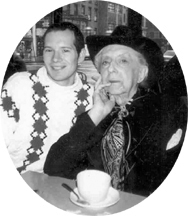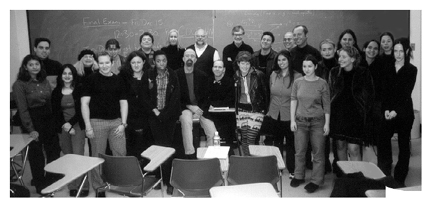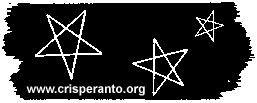 Photograph by Ramon Olivos. |
HELL'S ANGEL by Michael Angelo Tata |
|
In the fall of 2000, an irregular arrangement of planets affecting world neurotransmitter levels and deranging many an intellect put me in the unique and enviable position of being permitted to teach the first academic course anywhere on or off the continent which would focus exclusively on the life and work of Quentin Crisp. Normally, my attempts at spicing up university menus with close examinations of American popular culture and other crass materials not often thought of as worthy of deep or even shallow reflection had met with a combination of horror, disdain, consternation, and revulsion by empowered communities of taste, yet in this rare slackening of epistemological and pedagogical reigns, my mischievousness would meet no resistance and, unimpeded by philistine standards of cultural legitimacy or moral concerns about the future of the university, I would be given the rare opportunity of being charged with introducing a bright and enthusiastic group of teenagers to the ideas, quips and bon mots of this maverick of style and panache, Quentin Crisp. Débuting at Hunter College in the English Department, and, clustered with a few other intellectual oddities under the category "Special Studies Seminars," the course, which I, in keeping with Madonna, named Beautiful Stranger: Quentin Crisp, was a slam dunk. How this solid gold moment came to pass will consume the remainder of this memoir, as it represents my own formulation of an aesthetics of desperation, a poetics of post-glamour, an esprit dandy. I met the legendary and inimitable Quentin Crisp on a sultry August après-midi at the Cooper Square Diner on Manhattan’s Lower East Side. I myself had been frequenting the restaurant since, two weeks earlier, I had moved from a friend’s living room in Center City Philadelphia to an ex-studio/converted 3-bedroom next to an abortion clinic on Mott Street (Quentin’s notorious comment in favor of abortion for gay fetuses comes to mind; how I loved him for the horrible things he said). Poor, alone, and infinitely exhilarated by the wealth of existential possibilities that lay before me, I lunched each day at Cooper Square on Belgian waffles and scrambled eggs, jotting down poetic fragments in my leopard-print notebook as I stared wistfully into space at the throngs of punk rockers, homies, and NYU dropouts who passed gingerly by the window on whose scopic generosity I depended for inspiration. Perhaps that day I wrote a poem about the children at Patricia Field, an erotic encounter at Tunnel with an aging bodybuilder, or how many chest exercises my new workout regimen included, or perhaps I simply timed out and sat catatonic in front of a blank page. Regardless of where my head was at the time, a sudden detonation indicative of a neighboring source of star power interrupted my groove and sent me catapulting through space like a particle shot out of an accelerator in the Nevada desert. Could it be him? The Quentin Crisp? I hardly knew what to think. I had never read any of his books and hadn’t even witnessed any of his cinematic appearances, so why did it matter to me that, two tables away, a meta-eccentric old coot in a black cowboy hat sat nibbling a grilled cheese sandwich as he floated self-intoxicated on a wave of bliss? Because he was. Years later, when I had taken the time to inform myself about his many œuvres, this visceral reaction would make sense; specifically, his notions about "The Profession of Being" in How to Have a Life Style were confirmed by my own initial entrapment in his celebrity headlights. Charisma, corona, aura, ambiance, allure: these were all that mattered, and these were the qualities to which I implicitly responded. Essentially, all I knew about him was that he was notorious for being notorious and chic for being un-chic. This was enough for me; a nascent media whore and budding hanger-on, I stargazed and strategized. Too shy to speak with him directly, yet unwilling to let my chance to make his acquaintanceship wither on the vine, I thought quickly and drafted a note expressing my sincere desire to share his world and providing him with my name and contact information, should he deign to reach out to me. This I awkwardly tossed his way as I stumbled out of Cooper Square and into the balminess of the late summer humidity and frenzied human masses cutting a path through it. What did he think of my insouciance? Had it been rude of me to interrupt his leisurely luncheon with an inscribed projectile encouraging him to initiate a friendship with me, a stranger and nobody? Living the high life, would he ever take the time to phone the weird amalgam of poet, wannabe and muscle-head I projected? In the weeks that followed, time went by as usual; forgetting entirely about my would-be brush with fame, I spent each golden, luxurious, extravagant NYC minute immersing myself in the intoxicating chaos of life in the fast lane. The tissue of life enfolded me; leaving behind the utter emptiness of Philadelphia for the brimming plenitude of Chelsea and the West and East Villages, I danced, pumped up, read, wrote, conversed, observed, got off, loved, lusted, absorbed, all at a velocity well in excess of lightspeed. Summer evaporated into fall, which in turn dissipated entirely, leaving in its stead a residue of ice crystals and snow showers: winter had arrived, and I had survived three seasons in a place everyone back in Phillie had assured me would spit me out like the bad seed I was. How banal—I hadn’t expired, but had managed to convert cosmopolitan froth into an everyday phenomenon no more shocking than rituals of imbibing, processing and emitting. What was next? On one particularly nondescript January day, a telephone call from the nether reaches of reality intruded upon my urban complacency: On the other end of the receiver came a voice I instantly recognized as Quentin’s. "Yes … Michael Angelo? I came across your name on a scrap of paper the other day and thought I should call to invite you to lunch." Stunned, I immediately accepted. Though he had no idea whatsoever who on earth I was or purported to be, this trifling fact did not impact his Austenian sense of decorum, which had urged him to honor all social obligations, no matter how picayune or dubious. At first, he thought I was Michelangelo Signorile, and offered some commentary on my involvement with the "outing" phenomenon; discovering that I was indeed an unfamous Michael Angelo rather than a semi-famous Michelangelo made little difference--since I had been so kind as to have jotted him a timid little note of introduction, he would repay me with an afternoon in which I would be accorded the honor of paying him homage at the diner at which he habitually held court. Our first meeting was nothing short of momentous. A man from Columbia University interviewed him while a dominatrix friend of his entertained me with juicy tales of fetishism and sexual spectacle. At one point, people came by to snap our photos, while shortly thereafter another photographer popped in from the street to hand Quentin a photo of him that had been recently developed; in it, Quentin stood placidly against a row of Hell’s Angels Harleys (who knew these were his SRO-mates!). All the while Quentin sat infinitely pleased yet physiognomically nonplussed in front of a bright orange grilled cheese sandwich. How he had remained a teenager all these years astounded me. Stories of his jaunts to Tunnel and Limelight rocked my world and made me ponder the future of my own glamour. A love affair was born. Over the course of the next two years, I would meet him at the diner as often as I could, telling him next to nothing about myself as I listened to him dis Princess Diana, complain about how pervasively hideous all of Great Britain was cursed with being (especially the gene pool), wonder about Penny Arcade’s constant state of rage, and dispense wisdom about weight loss regimens, cosmetic surgery and his undying affection for the superficialities of Los Angeles. In the spring of 1998, he was so kind as to let take part in Chelsea Boys, a video I produced along with my lover Roman Olivos and colleague Ramón Rivera-Servera and starring Quentin, chanteuse/schmodel Chloee, and queer theorist Eve Kosofsky-Sedgwick. For the video, Quentin sat sipping champagne while a captive audience watched split-screen videos of myself and Ramón eating Krispy Kreme donuts and working out at Crunch Fitness. In the midst of everything, Chloee modeled clothes onto which I had silk-screened my poems. Like Edie Sedgwick in Warhol’s Vinyl, he asked no complicated questions about his environment: all that mattered were the champagne and atmosphere, neither of which demanded comprehension. This happening/situation was the last time I saw Quentin. I spent most of the summer in L.A. editing screenplays and writing poems about trash. We were scheduled to meet shortly after a performance of his in England in the fall of 1999. This meeting never transpired, as his earthly meter ran out and the angelic train lifted him into the empyrean for an eternity of Hollywood films and mauve rinses. Quentin had died, leaving me to muddle through the exigencies of self-presentation alone. Armed with mnemonic slices of our time together, I was a veritable Luke Skywalker with whom the force resided. It took some time to organize my thoughts, which for the most part seemed to drift aimlessly from one synapse to another. When I finally did get myself together, the idea of pioneering an undergraduate course in which the brilliance, ebullience and effervescence of Quentin would receive critical attention came to me as a delicious improbability. Imagine my surprise when Richard Barickman, chair of the English Department at Hunter College (only a block away from the Versace store!), saw inherent value in a course which, via Crisp, would get students thinking about post-menopausal glamour, dandyism and flânerie, and was quick to offer me a spot in his program. At this point, I was able to conceal myself behind the thin veil of respectability that only a Ph.D. in anything can provide—for, having traded in my dancing shoes for eggheaded MLA conferences, I was, thanks to the CUNY Graduate Center, on my way to what might approximate a career in that cultural black box, "English Literature." Whatever it was about me that inspired the trust of a trained professional, the direct consequence of his patience, faith and prescience was that students during the fall 2000 semester could receive credit for working on queer icon Quentin Crisp. For those four splendid months, 35 bright and shiny undergrads from all walks of life met me twice a week to discuss Crisp’s written and performed works and the various cultural contexts into which they fit. Since students came from a wide variety of racial, ethnic and even "temporal" backgrounds (a squad of 3 fierce grandams really stole the show), Crisp’s works were scrutinized in novel and unprecedented ways. Was there a black dandyism? How could racial minorities participate in the haute aestheticism offered by Crisp and/or his predecessor Oscar Wilde? Was there a possibility of lesbian camp? Does glamour begin at age 50? How could Crisp balance democracy and aristocracy so perfectly? How could someone so complicated be so simple? These questions among others presented themselves to us as we convened to explore the outlandishness of Crisp’s système de la mode. All in all, the course was divided into three mini-sections: an introductory unit in which theories of dandyism, camp and flânerie were entertained, a unit in which Crisp’s major works were read, and a final unit in which a concept of post-menopausal glamour was fleshed out and tested. While some books were predictable, others were utterly idiosyncratic—and so students read not only Wilde’s Importance of Being Earnest and Crisp’s How to Have a Life Style, but also Susan Sontag’s Notes on Camp, sections of Harriet Beecher Stowe’s Uncle Tom’s Cabin, and Cher’s autobiographical tour de force The First Time. Concepts studied included the limits of performativity (was Quentin ever not Quentin?), haux couture, European and American decadences, the difference between beauty and glamour, and the care and packaging of self. From among the items in this milieu, students produced final projects of their own design. One student visited Quentin’s wax effigy at the newly opened Madame Tussaud’s and wrote a paper in which he applied various Crisp quips to other Tussaud celebrities; a budding psychoanalyst examined Crisp’s death-drive in light of Freud’s Beyond the Pleasure Principle. Another student, a filmmaker from Eastern Europe, spliced together footage from class with footage from the street to create the ultimate statement of Crispean itinerancy. I was impressed and thrilled by the range of topics these crafty teens and seniors had produced. The apogee of Beautiful Stranger: Quentin Crisp came when, with the help, love and support of Quentin’s literary executor Phillip Ward (also the editor of Mr. Crisp's final yet-to-be-published book Dusty Answers), a panel of "Crisp Experts" staged a public discussion about all things Crisperanto at Hunter. The panel was star-studded: Guy Kettelhack and Tom Steele (two of Crisp’s eminent editors), Mr. Ward, Stedman Mays (Crisp's agent), Sylvia Miles (underground film maven), Kirsten Showell (a beautiful and dear close Crisp friend), and Richard Connolly (filmmaker and media professor). For an hour and a half, these intimates of Quentin provided a wealth of insights into his motives and inner and outer lives. Who was this quirky émigré for whom life was an unending string of cocktail parties, art openings and fashion shows? Why had New York City been so quick to adopt him as its own? Could Quentin be cloned? Lastly: how could we as fans of his work accept him for the truly awful things he habitually and unapologetically said, utterances arising from what Stedman astutely referred to as "the dark side of Quentin Crisp"? Throughout the event, one presence emerged as irrepressible: Sylvia Miles. Stylishly decked out in rhinestones and rivets, and irascible to the point of comedy, she reinforced everything we had studied about glamour psychosis, therein assuring that our course would go out with the bang it deserved. "The only reason a person would take this class is that it’s not possible to fail it," she wryly remarked, causing those of us who had taken his ethos of the "Professional Loser" to heart to short circuit. Yet perhaps my greatest highlight was discovering that, nestled quietly among the sprawl of the 45-person audience, was none other than actress Julie Harris’ god-daughter, Julie Scherer. Flashbacks of Knots Landing flooded my brain as, post-discussion, she introduced herself to me amidst the hubbub and bustle. To think: Lillimae, Julie’s character as Joan Van Ark’s mother, might hear something about me from a daughter interested in my work! Posing politely for the flash of cameras, I made a grand exit, heading out with Ms. Scherer for a raspberry chai to end all raspberry chais. |
|


